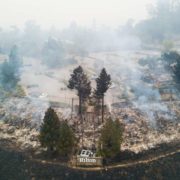I have always loved Joan Didion’s writing. While some of it seems dark such as her commentary on change over some of the most tumultuous eras in America, she has an unusual quality of perspective and observation, acting as witness to events of the day. Oddly, this has seemed even to be the case in her more recent memoirs, “The Year of Magical Thinking” and “Blue Nights”. Yet there is also a quality about her in “The Center Will Not Hold”, the documentary about her life as viewed through the lens of her director nephew, Griffin Dunne, that is emotional, intimate, accessible. You see it in the face, in the tears that do not fall, the questions Griffin asks and refuses to ask out of the most delicate yet sturdy love and respect for his aunt, and for Didion’s own ongoingness.
A Keen Eye
How much I wish Didion could engage in the writing of what is happening in America today. This is not to say she couldn’t. Maybe she has and I am unaware. But she is nearing the end of her own life’s 80-plus year chapter, frail and waifish, though still operating with a remarkably keep intellect and superlative observational and distillation powers, powers she’s always had in abundance.
How is it some individuals can cut through the noise of distortion that swirls around us on a daily and often minute-by-minute basis, with our plugged-in electronic addictive natures, rapid-fire lifestyles. Yes, there are keen minds in the American landscape that can write about political and cultural perils and persuasions that appear spot on. And yet more often than not, there is a positionality these voices can’t help but project even if subtly. Didion is not and has never been that kind of creature, or so it seems to me. She is a reporter after all, holding up a mirror of ourselves to ourselves in “photographer fashion.
The Best Lens
The observational and empathetic quality she reveals in all her work is fine and rare. How I wish she could speak to all of us now about what her reportorial muscle observes in today’s culture–the upheaval, the apparent tipping point of self-destruction of the country similar yet different from the 1960s. We need her voice or at least a voice as close to hers as is possible, a voice with distance yet compassion without being overtaken with undue emotionalism or sentimentality, qualities which we are sorely in need of at this time in our history.
If not Didion who will tell us that our culture and American way of life has atrophied and is disintegrating slowly, likely irreversible from decades of denial, unable to discern truth from falsehoods, medicating ourselves with not just drugs and alcohol but worse: naivete that our highest values would triumph over the lowest animal natures of greed, power, and deceit. She could show us that many people are so good, the ones you meet on the street, the ones who help their neighbors in time of peril like California wildfires, Houston, south Florida, and Puerto Rican hurricanes and floods, Las Vegas concert-goers, and surely those mowed down on the New York bike path recently. While we see them ourselves, they become tainted by media’s near-pimping of them for their own ends where the word hero is thrown around and actually cheapened through overuse and overexposure.
The Clearest Voice
Didion would know how to show us more clearly our government and its many institutions, as well as business and commercial enterprises, as overlarge and bloated yet essential at a basic level for the citizenry, all portrayed without positionality and sentimentality. With her keen eye she could demonstrate with clarity and distillation that we have become an overwhelmed society long before natural or man-made disasters and tragedies occur. While other voices have and continue to write about our nation and culture’s decline, almost always they include their own positionality, own agenda, which is part of the problem after all.
In “Blue Nights” and in “The Center Will Not Hold” Didion examines some of her own denial and avoidances of course, or at least reflects on areas of life she ignored or minimized herself– her relationship with her husband as well as that of her daughter. Sometimes it seems it is the post mortem that offers the clearest witnessing offering less attachment and greater clear-eyed scrutiny of missed opportunities while owning one’s own participation in choices. Is that what will happen in America? Only after it’s dead or gasping its last breath as a culture and superpower will we be able to see our own personal distortions, our own individual culpability however it may be measured?








I would love to see this movie. I’ve thought of her often over the years. With regard to the voice of her time and age, I have a feeling Ruth Bader Ginsburg’s “My Own Words” from last year is right on target. RBG has become my personal hero when I discovered she does the yogic plank for a full minute twice a day. And she’s in her eighties. Inspired by this, I try to do it also but it’s really not at all easy. That’s why she is who she is. I haven’t read her book yet but I will! Thanks, Rosalie!
Thanks, Cate. I’ll check out RBG’s writing you reference above. The film I mention above is available on Netflix.